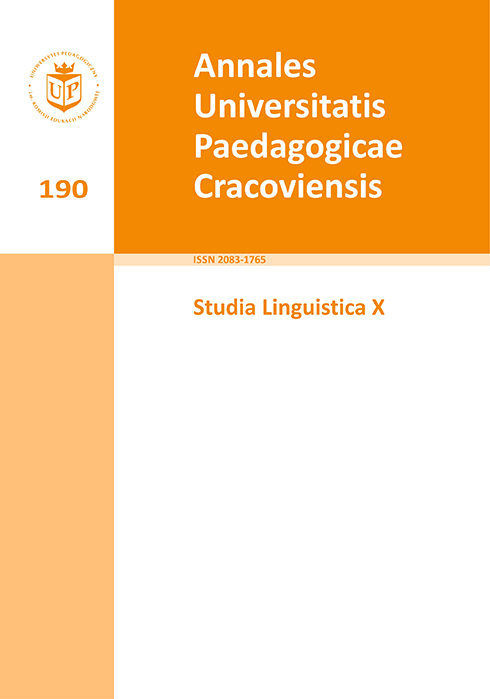Północnokresowe i białoruskie nazwy jałowca na tle słowiańskim
Main Article Content
Abstract
The Polish-wide word jałowiec (Juniperus communis) in the Polish language of the north- eastern borderlands exists (already since Adam Mickiewicz’s times) as the variant jadłowiec, and in the present Wilno dialects also as the forms jodłowiec, ja/edleniec as well as a number of other forms. Among the aforementioned forms the variants which feature -d- are a result of Polish-Belarusian contact, due to which the Belarusian jadło ec arose from the native jało ec as a hypercorrect form through adideation to the Polish jodła, and jadleńec arose from the native jaleńec according to this pattern. The forms with -d- which emerged in this manner were borrowed by the regional Polish language from Belarusian as jadłowiec and the less frequent jadleniec. The article also explains the names of the juniper in other Slavic languages. The majority of them originally referred to shrubs of coniferous trees (fir, spruce, pine).
Downloads
Article Details
Author, submitting a text to the editorial board of the journal “Annales Universitatis Paedagogicae Cracoviensis. Studia Linguistica", certifies that the content of the article has not been published so far and that the work does not violate in any way the copyright or related rights of other person, as well as other rights of third parties, and that no one's rights to the work (or any part thereof) have been missed. After signing the contract, the property rights to the published materials are transferred to the University of the National Education Commission, Krakow.
“Annales Universitatis Paedagogicae Cracoviensis. Studia Linguistica” is an open access journal, and all its content is made available free of charge to users and institutions under the Creative Commons CC-BY-NC-ND 4.0 license (attribution, non-commercial use, no derivative works). Under this license, the authors agree that their work may be lawfully reused for any purpose, except for commercial purposes, without the prior consent of the author or publisher. Everyone can read, download, copy, print, distribute and process these works, provided that the author's marking and the original publication place are correct. Published texts may not be used to create derivative works (e.g. to translate and publish in another language without the consent of the publisher). This is in line with the BOAI (Budapest Open Access Initiative) definition. "Studia Linguistica" does not charge for submitting or processing articles.
References
Babik Z., 2008, Pojednanie z lasem. W stulecie „argumentu florystycznego” w slawistycznych badaniach etnogenetycznych (1908–2008), Kraków.
Google Scholar
Boryś W., 2005, Słownik etymologiczny języka polskiego, Kraków.
Google Scholar
Brückner A., 1927, Słownik etymologiczny języka polskiego, Kraków.
Google Scholar
Budziszewka W., 1965, Słowiańskie słownictwo dotyczące przyrody żywej, Wrocław.
Google Scholar
Budziszewska W., 1974, O słowiańskiej nazwie modrzewia ‘Larix’, „Rocznik Slawistyczny”, t. XXXV, s. 21–23.
Google Scholar
Czernych P., 1999, Istoriko-etimołogiczeskij słowar sowriemennogo russkogo jazyka, t. I–II, Moskwa.
Google Scholar
ESSJ – Etimołogiczeskij słowar slawjanskich jazykow, Moskwa 1974 i n. Janyszkowa I., 2000, Otrażenije żyzni i predstawlenij Slawjan w nazwanijach możżewielnika, „Studia Etymologica Brunensia”, t. I, s. 57–66.
Google Scholar
Kielak O., 2015, Etymologia i językowo-kulturowy obraz jałowca i kaliny, „LingVaria”, t. 1 (19), s. 181–193.
Google Scholar
Koniusz E., 2001, Polszczyzna z historycznej Litwy w „Słowniku gwar polskich” Jana Karłowicza, Kielce.
Google Scholar
LABNH – Linhwistyczny atłas biełaruskich narodnych haworak, t. I: Raslinny i żywjolny swiet: karta 146 jadłoec, Minsk 1993.
Google Scholar
Moszyński K., 1957, Pierwotny zasiąg języka prasłowiańskiego, Wrocław.
Google Scholar
Nitsch K., 1931, Jodła, świerk, smrek, „Lud Słowiański”, t. III, nr 2, A, s. 206–222.
Google Scholar
OLA – Obszczesławjanskij lingwisticzeskij atłas, t. III: Rastitel’nyj mir: karta 394 Juniperus communis, Minsk 1988.
Google Scholar
Rembiszewska D.K., 2007, Słownik dialektu knyszyńskiego Czesława Kudzinowskiego, Łomża.
Google Scholar
Rieger J. (red.), 2006, Słownictwo polszczyzny gwarowej na Litwie, Warszawa.
Google Scholar
Rieger J. (red.), 2014, Słownictwo polszczyzny gwarowej na Brasławszczyźnie, Warszawa.
Google Scholar
SEK – W. Boryś, H. Popowska-Taborska, Słownik etymologiczny kaszubszczyzny, t. I–VI, Warszawa 1994–2010.
Google Scholar
SGPKarł – J. Karłowicz, Słownik gwar polskich, t. I–VI, Kraków 1900–1911.
Google Scholar
SJPWil – Słownik języka polskiego (tzw. wileński), t. I–II, Wilno 1861.
Google Scholar
Sławski F., 1952–1982, Słownik etymologiczny języka polskiego, t. I–VI, Kraków.
Google Scholar
Spólnik A., 1990, Nazwy polskich roślin do XVIII wieku, Wrocław.
Google Scholar
SPS – Słownik prasłowiański, Kraków 1974 i n. Tyszkiewicz K., 1871, Wilia i jej brzegi, Drezno.
Google Scholar
Wajda-Adamczykowa L., 1984, Polskie nazwy modrzewia ‘Larix’, [w:] Dialektologia, ono- mastyka, stylistyka, red. M. Zarębina, Kraków, s. 31–47.
Google Scholar
Wajda-Adamczykowa L., 1989, Polskie nazwy drzew, Wrocław.
Google Scholar
Zdaniukiewcz A.A., 1972, Gwara Łopatowszczyzny, Wrocław.
Google Scholar
